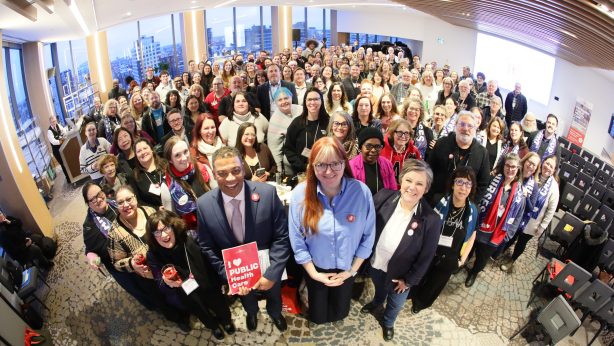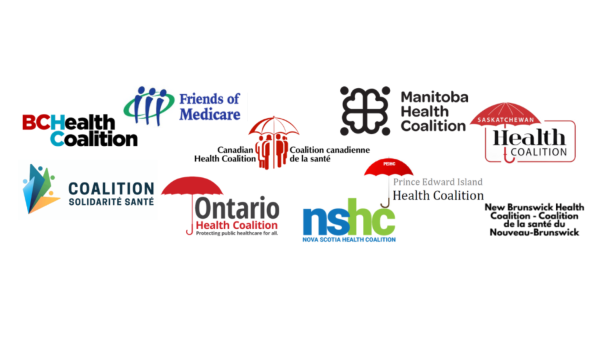Researchers to explore social determinants of health and how profiteering worsens health inequalities
Social determinants of health refer to the social and economic conditions that affect one’s health. Income, working conditions, education and literacy, food security, gender, race/racism and access to health care are just some social determinants of health.
Learn more from researchers concerned about profit-making in health care as it relates to the social determinants of health at a research roundtable on the profitization of health care in Canada this October.
The day-long research roundtable at the University of Ottawa on October 23 is being organized by the Canadian Health Coalition and the University of Ottawa’s Centre for Health Law, Policy and Ethics.
The research roundtable will feature a panel with the country’s researchers on the financialization of health care. Space is limited and early registrations are encouraged. Registration deadline is September 30.
Speaking on the panel are Marc-André Gagnon, Zakariya Thraya, Tim Aubry and Donna Wilson.
Access to medicine is considered a social determinant of health because it influences health outcomes. Disparities in access to medicine can originate from socio-economic status, education, geographic location, and systemic discrimination. When individuals cannot afford necessary medications, their ability to manage chronic conditions and stick to treatment plans is significantly impaired, leading to worse health outcomes.
Exploring this phenomenon further with a case study is Marc-André Gagnon, a professor of political economy at Carleton University. He will speak about the challenges in access and affordability of prescription drugs in Ontario Indigenous communities.
Gagnon notes that “no systematic data exists to understand potential issues of access and affordability of prescription drugs faced by First Nations people on reserve.” Gagnon and his research team are performing an environmental scan to better understand existing issues faced by Indigenous communities in Ontario to access prescription drugs.
Gagnon and his team have found geographical difficulties to access the necessary medicines in a timely fashion. They have also noted refusal to dispense prescription drugs due to Indigenous status. They have also observed administrative hurdles due to competing insurers refusing to be payers of first resort.
Housing is another social determinant of health. Arnel Borras in his new book, Health and Health Care Inequities (Fernwood), devotes one chapter to housing. He writes, “Poor quality housing harms our physical, mental, and psychosocial health. Substandard housing leads to more sickness and deaths among low-income workers and people experiencing poverty.”
Discussing the need for a Housing First strategy to address homelessness of people with complex mental health and substance use health concerns at the research roundtable are Zakariya Thraya, senior policy and research analyst at the Mental Health Commission of Canada and Tim Aubry, emeritus professor at the University of Ottawa.
Thraya and Aubry argued that research shows that supportive housing, an important social determinant of health, leads to improved health outcomes and decreases in costs across health, social service, and justice systems.
How does the profit motive affect Housing First initiatives? Thraya and Aubry argue, “Despite strong evidence, a factor limiting the widespread uptake of Housing First across the country is the increase in privatization across health care and housing services over the last decade.” Noting a worsening housing crisis, increased rates of homelessness among people with mental health and substance use concerns, and mounting economic pressures, the researchers call for support for Housing First “as an avenue to address the challenges posed by increased privatization of health and housing services.”
Where one lives and their access to health care are other key social determinants of health. Many Canadians appreciate our health care system in relation to that of the U.S. where people go bankrupt if they get sick.
Donna M. Wilson, a registered nurse and a Professor Emeritus at the University of Alberta, will speak on her research on health care access in Canada and the U.S.
Wilson will look at how 200 million Americans are forced to “rely on workplace-provided health care insurance, privately purchased health care insurance, or luck in the hope that they will not need health care services or that they can rely on charity services for indigent people needing emergency care.”
Wilson will discuss the different health outcomes that can be expected between U.S. and Canadian citizens. She will compare bankruptcies rates, mortality and morbidity rates, and age at death across the two countries. She will also examine “profit-making, a driving force within the U.S. system and one that could become more problematic in Canada.”

Future blog posts will feature other researchers presenting at this year’s research roundtable.
Deadline to register is Sept. 30.



